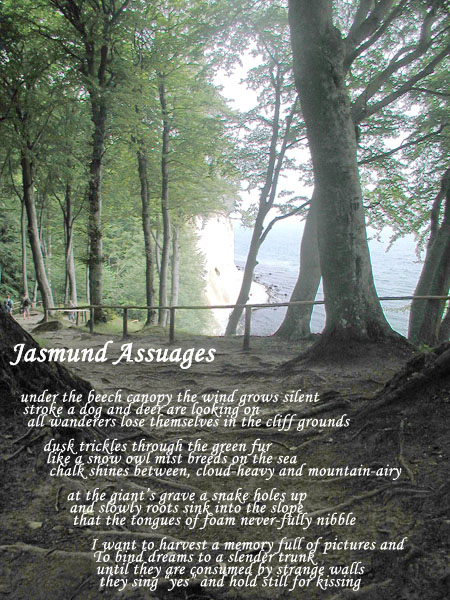|
Werner Schmitt

Photo:© Werscheidi
Note:
Jasmund is the name of a nature reserve on the German Island Rügen in
the Baltic sea. It lies on the Island’s northern coast and includes the
famous chalk cliffs. A literal, but popular translation of Jasmund reads
“the mouth of yes”.

Sentimentality


for the last time I have wept
over the sabre-toothed tiger's extinction
this magnificent sleek barbarous
delightfully insatiable animal
with its storm of hisses
and once I believe
the dinosaurs conked out
because of the ice age
or the fall of a star
since they were irreplaceable beasts
and now I nearly weep
because you say
you need me
but unfortunately
I can't be needed
any longer
German version read by Werner Schmitt; English by Jim Doss.

“Day of ‘German’ Unity”
Turbulent rejoicing
in pubs and festival halls
sounds of fanfare
glasses clink, lawful anthems
from all screens and loudspeakers
in the sinister park beside
the dismantled bench
covered with fallen leaves
a hobo hums
The International * * The International is the anthem of the international revolutionary movement of socialism and communism. Its refrain is: "This is the final struggle/Let us join together and tomorrow/The International/Will be the human race."
 Village Cemetery
with laughter and radio
young people mow
a meadow free
for windfall
apart
inside the pale-red border of the wall
in the sloped bowl
memorial stones crowd together
splendidly polished
the old woman searches
for her space
supported by a stick
behind her lips
engraved names
walk once more

Guests in Dwasieden
ferns, blackberries and mullein
dreaming about blown up palaces
draw a green curtain
over the futile devastation
under bright bareness in the crowns of the beeches
there’s no roof in the field of ruins:
half cast aside, half buried skeletons of concrete
where the instruments of murder and corporals lurked
ants now march across asphalt streets
from the buzzed off army not even
the nation and the people remain behind
soon the earthen bunkers will resemble giant’s graves
rusty fences and “private property” continue to lock out
be Urian, enjoy decay
and uncontrolled growth; let the rose hips turn red
in the most flowering of all landscapes
Note:
Dwasieden is a forested area on the German Island Rügen that resembles Jasmund, only its chalk cliffs are not
as tall and imposing. Between the two regions lies the city of Sassnitz and its harbour. On the Dwasieden shore an impressive palace was built
in the 1870s with a riding stable and marina; it belonged to a very wealthy banker who even received Kaiser Wilhelm II there. In 1947, at the beginning of the era of the German Democratic Republic (GDR), i.e., Communist East Germany, the castle was blown up and an expansive military installation of the National People’s Army was
built around the ruins. Since the end of the GDR, the site is not only unused, but it is forbidden to even enter.
© Werner Schmitt
|

